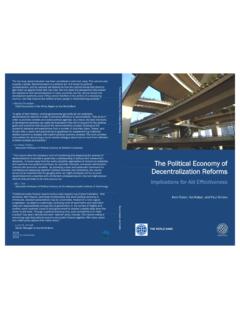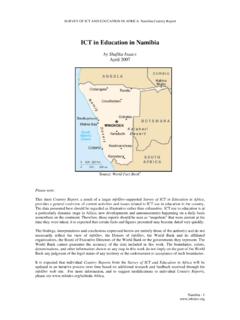Transcription of Informationand communications technology(ICT) agencies
1 Informationandcom municationstechnology(IC T)agenciesFunctions,structures, and best operational practicesRobert SchwareRobert Schware is Lead Informatics Specialist, The Global ICT Department, The world bank , Washington, growing number of small states are in the processof establishing ICT agencies to address information societyissues of e-government, e-infrastructure, e-industry, e-learning,and e-commerce. Some large countries are in the process ofintegrating telecommunications, IT, and broadcasting into asingle ICT agency. This paper outlines the functionalrequirements for such an agency, and presents a range ofinternational best practices for their focus and operation.
2 Thepaper also suggests interim measures that can be taken beforesuch agencies are legally society, Information systems, communications processes, Electronic commerce,International cooperationIntroductionThe use of information and communicationstechnology (ICT) is widespread. ICTs are an essentialtool for the efficient administration of an organization,and in the delivery of services to its clients. ICTs are beingintegrated into procedures, structures, and productsthroughout business, government, and the community. Themarriage of information technologies and communicationscombined with the explosive growth in communicationsnetworks, illustrated by the Internet, is resulting in majorsocial and economic changes.
3 There is a revolution in theway we electronically store, access, and deliver informationwhich is critical in shaping the effectiveness of anorganization. This is equally true of take advantage of these technologies and use themeffectively, organizations need to develop an overallframework and strategy for their application, and to have anorganizational structure in place to manage the developmentof strategies and oversee their implementation. This isparticularly necessary given the rapid pace at which thesetechnologies are worldwide have taken responsibility toprovide national leadership in the development andapplication of technology in their countries.
4 It is neitherefficient nor desirable to implement ICT projects acrossgovernment, or in any large organization, without having apolicy in place with key strategies specified. These must takeaccount of the government s economic priorities and needfor the efficient use of its own resources. This is beingachieved by the establishment of an administrative structurewithin government, with specific responsibilities to develop ai n f o r mThe Emerald Research Register for this journal is available current issue and full text archive of thisjournal is available findings, interpretations, and conclusions expressed here are thoseof the author and do not necessarily reflect the views of the world n f o 5 , 3 2 0 0 3 , p p.
5 3 - 7 ,#M C B U P L i m i t e d , 1 4 6 3 - 6 6 9 7 , D O I 1 0 1 1 0 8 / 1 4 6 3 6 6 9 0 3 1 0 4 8 7 2 2 83national vision for ICT to prepare an implementation plan withkey strategies having specific goals to realize the vision, andan action plan for their growing number of small states are in the process ofestablishing ICT agencies (see Appendix for a selection ofICT ministries and agencies ). This paper outlines thefunctional requirements for such an agency, and presents arange of international best practices for their focus andoperation. The paper also suggests interim measures thatcan be taken before such agencies are legally of an ICT agencyThe functions of such an agency recognize the three basicresponsibilities that central governments worldwide mustaccept for ICT.
6 These are:(1)Government as a regulator. As the national regulator, thecentral government is responsible for setting nationalrules for the use of technology . This includes, forexample:&the legal framework that enables electroniccommerce (e-commerce) to be promoted at anational level and the policing of this framework;&the national standards governing data privacy andsecurity;&laws covering intellectual property;&adopting data and communications standards toensure a country is aligned with internationaldevelopments in ICT, thus enabling internationalcompatibility and interconnectivity, etc.
7 ; and&rules covering access to information sources, bothnational and international, and including theInternet;(2)Government as a facilitator. As a facilitator thegovernment can seek to stimulate the use of andaccess to ICT by its citizens. It can encourage thedevelopment of the private sector industry by providingassistance and removing roadblocks to progress. TheICT services industry and other knowledge industries donot require large investments in material infrastructurelike factories, raw materials, road ways and other publicutilities. They can be located anywhere in a countryprovided there are communications facilities at par withglobal standards, and high quality and cost effectivehuman resources.
8 (3)Government as a large user of ICTs. As a large user ofICTs, often the largest in the country, government mustseek to use ICT for the cost efficient delivery of servicesand information to its citizens and in the efficient runningof the government administration. Being a majorpurchaser of ICT equipment and services, it can alsoinfluence the market and, for example, use its buyingpower to foster the development of a national ICTindustry. It can also serve as an example ofbest of the ICT agencyTo establish an ICT framework, governments internationallyhave created organization(s) with responsibilities to establisha vision for ICT, and strategies to achieve the vision, takinginto account national issues.
9 The responsibilities of such anorganization typically include:&developing a national vision for the use of ICT anddeveloping strategies to realize this vision, including anaction plan for their implementation strategies havetargeted specific sectors, industry development,education, health, rural, tourism, and/ or governmentservice delivery;&establishing a unified policy for all ICT issues in publicand national administration;&providing national leadership to establish anenvironment that enables the country to take advantageof the benefits from technology ;&defining government policies and objectives related tothe use of information resources;&supplying government with practical recommendationsfor the use of ICT to assist in achieving its economic andsocial objectives this will address informationresources in public administration and the setting ofsuitable unified standards and best practices to addressall information operations;&consulting widely with all sections of society to obtainideas and encourage participation to develop nationalpolicies and strategies, and to obtain commitment.
10 &establishing a legal framework for ICT coveringintellectual property, copyright, privacy, and security,etc. and preparing and following-up on the necessarydecrees, laws, and regulations needed for theachievement of strategies;&ensuring that the country is aligned with internationalstandards and developments in communication ande-commerce;&removing the roadblocks to the development of an ICT-enabled services industry;&providing specialist information services to differentsectors of the economy, such as the education, health,education, rural and tourism sectors;&establishing methods and procedures required by thevarious public administrations (central government, localgovernment, academia) for facilitating and unifyinginformation exchange (ensuring the adoption ofstandards that enable full compatibility locally andinternationally);&improving the efficiency of government administration byadopting best practices, use of common/compatiblesystems, reducing duplication of effort, and cuttingscosts.
















